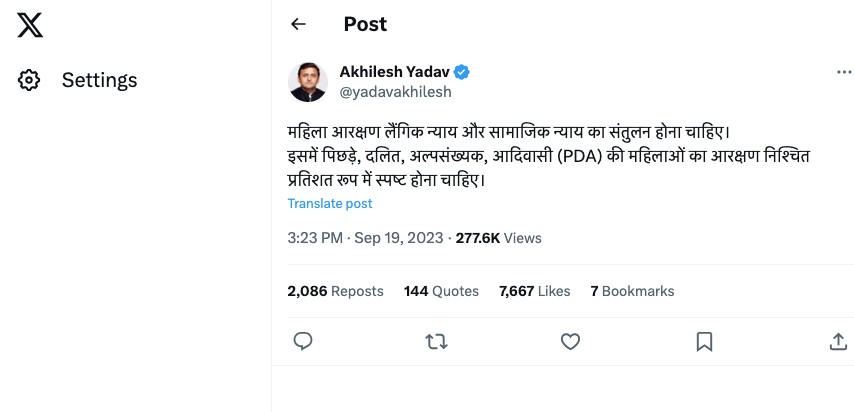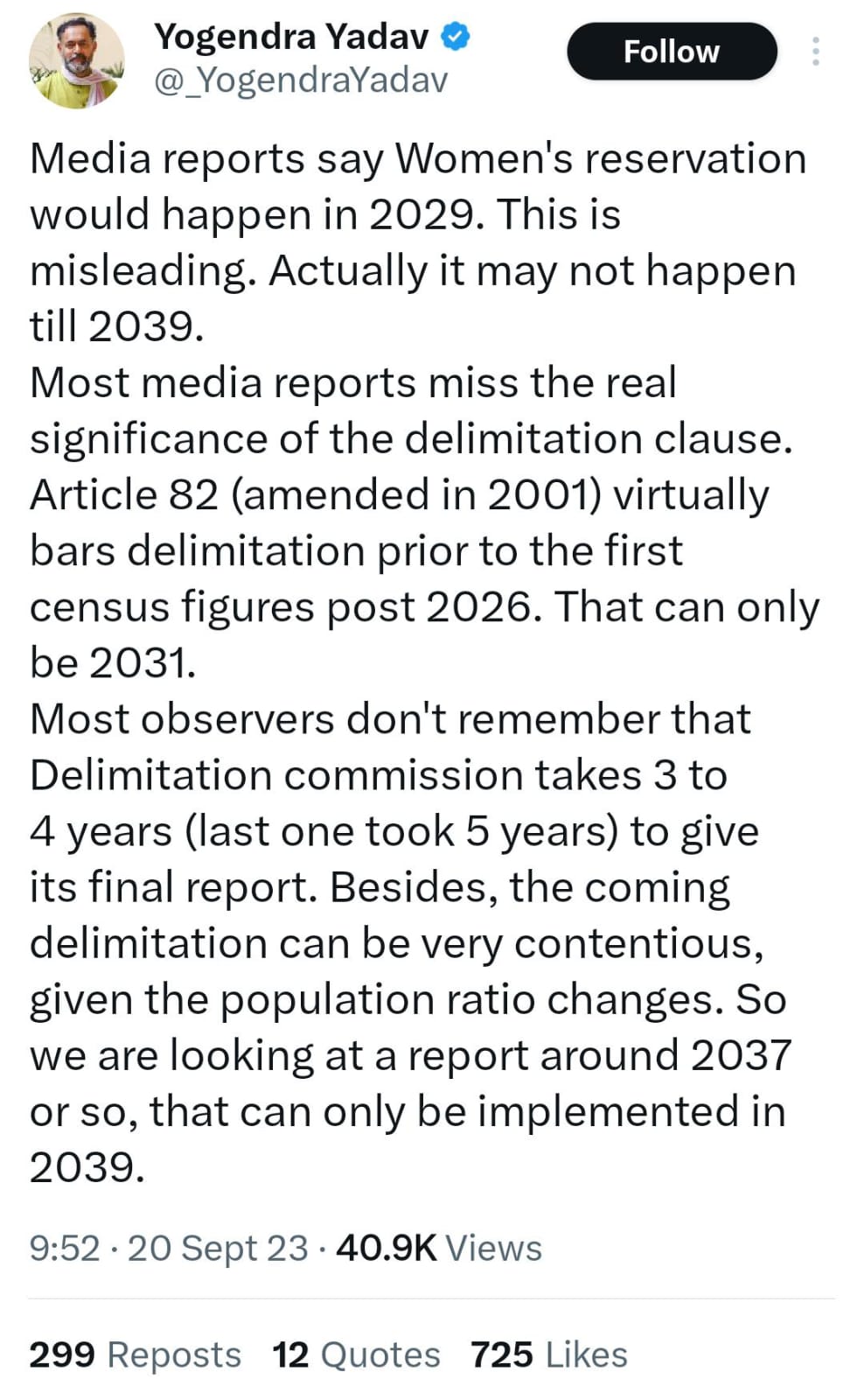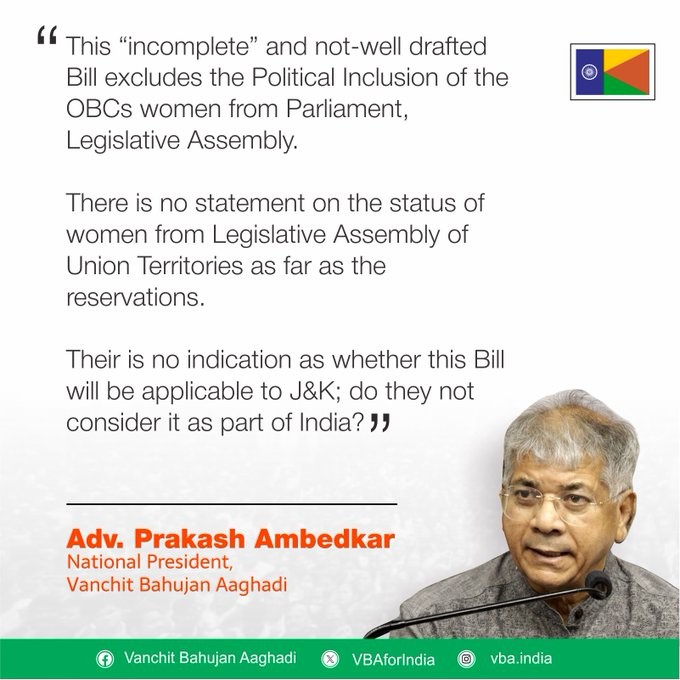Asaduddin Owaisi was quoted by PTI, saying, “We have never been against women empowerment. However, if a law is being made, it is important that OBC and Muslim women get a share in that quota.”
– Shyma S.
New Delhi, 20 Sep: On the day the Parliament members moved ceremoniously to the new building, the BJP government introduced the 128th Constitutional Amendment Bill, 2023, to bring in 33% reservation for women in the Lok Sabha and all state Legislative Assemblies. The Bill extends the quota to the seats reserved for SC/STs.
 Notably, the reservation does not extend to the Rajya Sabha or State Legislative Councils. However, unlike its earlier drafts, it does include some form of sub-quota reservation, however, critics and opponents have questioned some aspects of it.
Notably, the reservation does not extend to the Rajya Sabha or State Legislative Councils. However, unlike its earlier drafts, it does include some form of sub-quota reservation, however, critics and opponents have questioned some aspects of it.
Following the trend of titling bills in Hindi rather than English, the Narishakti Vandan Adhiniyam however, can only possibly be implemented upon the completion of the delimitation exercise based on the first Census conducted after the passage of the Bill, which means, only after 2026. The decennial Census has been delayed since 2021. Mandating an extendable 15-year reservation period, the bill is inextricably linked to the delimitation process, which itself is in deep controversy for other reasons. The delimitation exercise will effectively reduce the strength of the Southern states, which have lower populations on average.
 So, a bill that was brought with so much rush and pomp will not be in effect for years to come. This is therefore being seen more as an election plank, both in terms of the assembly elections this year and the national polls to come in 2024, reaching out to women voters. As per its present strength (which will significantly increase post-delimitation), the proposed bill would take the minimum amount of women MPs to 181, the current house having 81 women MPs. Being a constitutional amendment Bill, it needs to be passed by both Houses with special majority and to be ratified by at least half the state Assemblies. The two main highlights of the bill are – “reservation of one-third of the total number of seats reserved for Scheduled Castes (SCs) and Scheduled Tribes (STs) for women belonging to the SC and ST categories” and “one-third (including number of seats reserved for women belonging to SC and ST categories) of the total number of seats for women.”
So, a bill that was brought with so much rush and pomp will not be in effect for years to come. This is therefore being seen more as an election plank, both in terms of the assembly elections this year and the national polls to come in 2024, reaching out to women voters. As per its present strength (which will significantly increase post-delimitation), the proposed bill would take the minimum amount of women MPs to 181, the current house having 81 women MPs. Being a constitutional amendment Bill, it needs to be passed by both Houses with special majority and to be ratified by at least half the state Assemblies. The two main highlights of the bill are – “reservation of one-third of the total number of seats reserved for Scheduled Castes (SCs) and Scheduled Tribes (STs) for women belonging to the SC and ST categories” and “one-third (including number of seats reserved for women belonging to SC and ST categories) of the total number of seats for women.”
While the Congress has called it an ‘election jumla’, members of the Samajwadi Party, Rashtriya Janata Dal (RJD), and VBA (Vanchit Bahujan Aghadi) have spoken up, saying that the bill does not include minority and OBC women. Mayawati’s BSP has indicated that it will support the Bill even if all its demands are not fulfilled.
Asaduddin Owaisi was quoted by PTI, saying, “We have never been against women empowerment. However, if a law is being made, it is important that OBC and Muslim women get a share in that quota.”
According to the legal website, The Leaflet, “The statement of objects and reasons attached to the Bill states that after completing 75 years of independence, India has entered into an ‘Amritkal’ with a goal of becoming ‘Vikasit Bharat (Developed India) by 2047’.”
As is well known, the Bill has a deeply controversial and chequered history. It has seen 8 governments and been occasionally resurrected for over 27 years. But social justice parties have always been skeptical of whether the bill would be a death-knell for representation.
It is considered that were the bill to go without any sub-quotas, it would only mean access for elite women or those from political families with powerful connections. While sub-quota has been included partially in the current bill and there seems to be more consensus around passing it even among the opposition than before, the bill yet again leaves out groups of marignalised women who should have been included.




